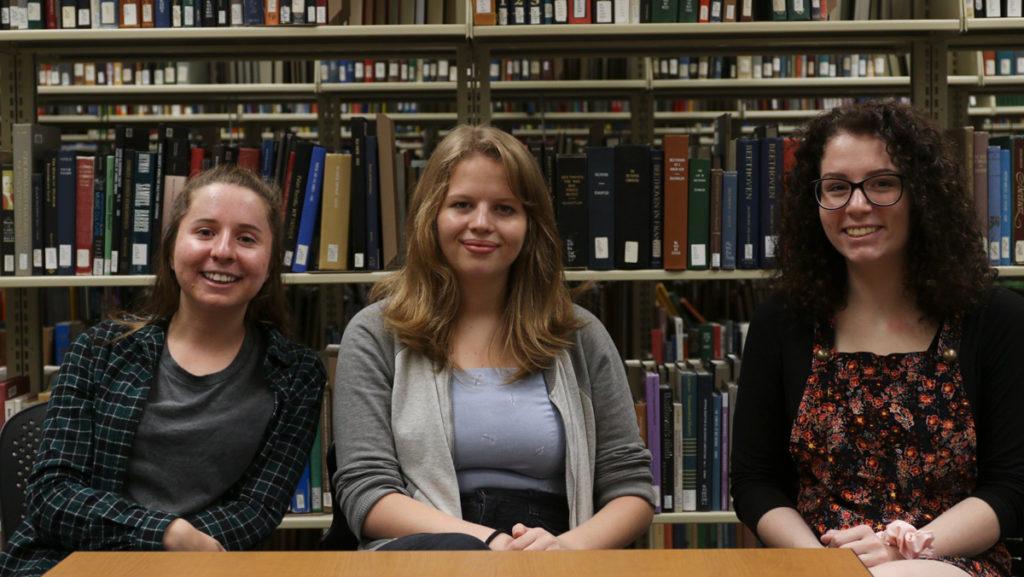A new community-based activism club at Ithaca College called Drop Knowledge has combined education and social justice to shed light on issues on campus and in the Ithaca community.
Drop Knowledge, created this semester, allows students to pursue social justice topics through individual research or group projects. The club consists of committees consisting of topics like education justice, environmental justice, race relations, LGBTQ justice and women’s rights. Club secretary sophomore Nadia Racaniello said the organization, which is entirely student-run, aims to educate the campus and local community about these issues by giving them access to information they may not have had previously by sharing their research on social media.
Sophomore Katja Krieger, president of Drop Knowledge, said that once the research pertaining to each project is completed, it will be published on Drop Knowledge’s website and social media pages, which are still being created, and will be shared throughout the community.
Krieger said the plans for the club were finalized over the summer. Last year, Elizabeth Bishop ’04, previously an assistant professor in the Department of Education, began to recruit students in her classes to lay the groundwork for the club. Bishop runs the national organization Drop Knowledge and oversees the Ithaca branch as the organization’s research director in her spare time. She is also an adjunct assistant professor in the Youth Studies program at the City University of New York and the director of curriculum and outcomes evaluation at Global Kids, a non-profit organization.
“We want our research to be accessible to everyone and shared across everything,” Krieger said.
Derek Adams, faculty adviser of the club and assistant professor in the Department of English, emphasized the student-oriented nature of the club and said it is focused around individual research.
“I think the goal of the club … is to empower individuals to take on causes of social justice that they find personally beneficial or socially and collectively beneficial,” Adams said.
The projects vary based on what issues students are passionate about. Krieger and Racaniello are working on a sex education project that aims to determine the quality of sex education in Ithaca’s public schools through surveys. The project will also attempt to help fill any gaps in students’ knowledge after the research is done by developing a curriculum.
Racaniello said other projects will include a podcast that will challenge the college’s perception of its own diversity, a project about women in STEM education and a media project documenting slurs that are used to put down students on campus.
Krieger said students are currently submitting their research proposals to Bishop. She also said students are in the planning process and are working on obtaining resources for their research. For the sex education project, Krieger has begun to reach out to other resources.
“We are working on finding contacts within schools and contacting Planned Parenthood and the other Planned Parenthood on campus,” Krieger said.
Racaniello said they have also recently finished a proposal for a grant they hope to win to find the project, but currently there is no funding for the student projects.
Bishop is currently advising the Ithaca branch via video conferences from New York City. Bishop said she is also working on developing branches in Miami and Los Angeles. Internationally, she is also working to establish a Drop Knowledge branch based in Paris that will focus on the treatment of LGBTQ and gender-nonconforming people in France.
Bishop said she became inspired to start the organization after working as an English and history teacher at a public school in New York City starting in 2006. She said she noticed that students in afterschool programs at high-poverty schools were very engaged in community activism.
In 2008, she started working with Global Kids. One of the programs they ran was called the Human Rights Activist project, which engaged students in community activism.
This led Bishop to conduct research on youth activism from 2012 to 2013 with five other alumni from the project. Subsequently, she published her book, “Becoming Activist: Critical Literacy and Youth Organizing,” which focuses on the power of youth activism and how it can build critical literacy skills. Bishop said Drop Knowledge was born from that research.
“We were doing this kind of critical pedagogy work and asking these open-ended questions,” Bishop said. “Young people were literally dropping knowledge into the space about their experience and their observations, and so from that we built out the project.”
Overall, Bishop said Drop Knowledge embodies her values about education, as it not only educates the community but allows students to learn about communities they are not a part of.
“As a scholar, that’s the part that’s important to me, too, is that there’s learning that can happen across spaces of difference,” Bishop said.








